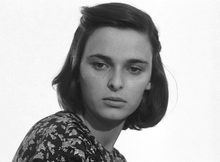
Ennio Morricone was an Italian composer, orchestrator, conductor, trumpeter, and pianist who wrote music in a wide range of styles. With more than 400 scores for cinema and television, as well as more than 100 classical works, Morricone is widely considered one of the most prolific and greatest film composers of all time. He has received numerous accolades including two Academy Awards, three Grammy Awards, three Golden Globes, six BAFTAs, ten David di Donatello, eleven Nastro d'Argento, two European Film Awards, the Golden Lion Honorary Award, and the Polar Music Prize in 2010.

La Piovra is an Italian television drama series about the Mafia. The series was directed by various directors who each worked on different seasons, including Damiano Damiani, Florestano Vancini, Luigi Perelli, and Giacomo Battiato . The music was written by Riz Ortolani, Ennio Morricone, and by Paolo Buonvino.

Rome, Open City, also released as Open City, is a 1945 Italian neorealist war drama film directed by Roberto Rossellini and co-written by Sergio Amidei, Celeste Negarville and Federico Fellini. Set in Rome in 1944, the film follows a diverse group of characters coping under the Nazi occupation, and centers on a Resistance fighter trying to escape the city with the help of a Catholic priest. The title refers to the status of Rome as an open city following its declaration as such on 14 August 1943. The film is the first in Rosselini's "Neorealist Trilogy", followed by Paisan (1946) and Germany, Year Zero (1948).

Telefoni Bianchi films, also called deco films, were made by the Italian film industry in the 1930s and the 1940s in imitation of American comedies of the time in a sharp contrast to the other important style of the era, calligrafismo, which was highly artistic. The cinema of Telefoni Bianchi was born from the success of the Italian film comedy of the early 1930s; it was a lighter version, cleansed of any intellectualism or veiled social criticism.
Italy–USA Foundation is a non-profit non-partisan organization based in Rome, Italy, established to promote friendship between Italians and Americans plus American culture in Italy.
The Nastro d'Argento is a film award assigned each year, since 1946, by Sindacato Nazionale dei Giornalisti Cinematografici Italiani, the association of Italian film critics.
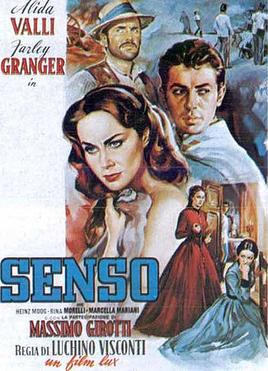
Senso is a 1954 Italian historical melodrama film directed and co-written by Luchino Visconti, based on Camillo Boito's novella of the same name. Set during the Third Italian War of Independence, the film follows the Italian Contessa Livia Serpieri, who has an affair with the Austrian Lieutenant Franz Mahler. It was Visconti's first color film.

Story of a Love Affair, released in the United Kingdom as Chronicle of a Love, is a 1950 Italian drama film directed by Michelangelo Antonioni in his feature-length directorial debut. The film stars Massimo Girotti and Lucia Bosè in lead roles. Despite some neorealist background, the film was not fully compliant with the contemporary Italian neorealist style both in its story and image, featuring upper-class characters portrayed by professional actors. Ferdinando Sarmi was, however, a fashion designer rather than a professional actor. Its story was inspired by the James M. Cain novel The Postman Always Rings Twice. In the film, the camera pans the same street corner in Ferrara, the director's native city, that appears in his film Beyond the Clouds forty-five years later. In 1951, the film won the Nastro d'Argento Award for Best Original Score and the Special Nastro d'Argento for "human and stylistic values".

Mauro Maur, OMRI is an Italian trumpeter and composer. He has collaborated alongside musicians such as Ennio Morricone, Placido Domingo, Uto Ughi, Riccardo Muti, Leonard Bernstein, Seiji Ozawa, and Pierre Boulez.
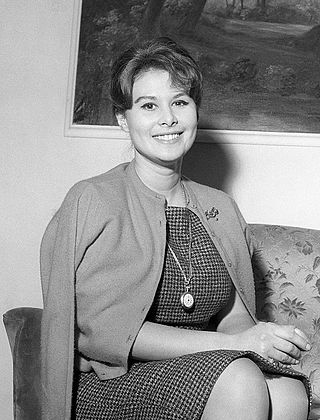
Countess Marisa Allasio is a retired Italian actress of the 1950s. She appeared in nearly 20 films between 1952 and 1957.

Allonsanfàn is a 1974 Italian historical drama film written and directed by Paolo and Vittorio Taviani. The title of the film, which is also the name of a character, comes from the first words of the French Revolutionary anthem La Marseillaise.

The David di Donatello for Best Score is a film award presented annually by the Accademia del Cinema Italiano to recognize outstanding efforts on the part of film music composers who have worked within the Italian film industry during the year preceding the ceremony. The award has been given every year since 1975, with the exception of the 1979 and 1980 editions.
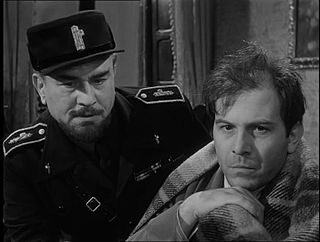
Long Night in '43 is an Italian film of 1960 set in Ferrara, in the Italian Social Republic German puppet state during the late stages of the Second World War. It was directed by Florestano Vancini and adapted by Vancini, Ennio De Concini and Pier Paolo Pasolini from a short story by Giorgio Bassani. The film stars Enrico Maria Salerno, Gino Cervi, Belinda Lee, Gabriele Ferzetti and Andrea Checchi.
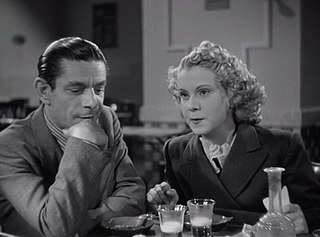
Lively Teresa is a 1943 Italian "white-telephones" comedy film directed by Mario Mattoli and starring Lilia Silvi, Roberto Villa and Carlo Ninchi. It was produced in the style of the White Telephone comedies popular during the Fascist era.

Difficult Years is a 1948 Italian drama film directed by Luigi Zampa and starring Umberto Spadaro, adapted from the 1946 short story Vecchio con gli stivali, by the Sicilian author Vitaliano Brancati.

Hornets’ Nest is a 1970 Italian-American war film directed by Phil Karlson and starring Rock Hudson, Sylva Koscina, and Sergio Fantoni. The plot focuses on a group of boys aged 7–14 who survive a massacre in their village in Northern Italy in 1944 and what happens to them.

Time of Indifference is a 1964 Italian–French drama film directed by Francesco Maselli starring Claudia Cardinale. It is based on the novel Gli indifferenti by Alberto Moravia.

Pino Rucher was an Italian guitarist active in orchestral settings and in film soundtracks.

Calligrafismo is an Italian style of filmmaking relating to some films made in Italy in the first half of the 1940s and endowed with an expressive complexity that isolates them from the general context. Calligrafismo is in a sharp contrast to Telefoni Bianchi-American style comedies and is rather artistic, highly formalistic, expressive in complexity and deals mainly with contemporary literary material, above all the pieces of Italian realism from authors like Corrado Alvaro, Ennio Flaiano, Emilio Cecchi, Francesco Pasinetti, Vitaliano Brancati, Mario Bonfantini and Umberto Barbaro.

